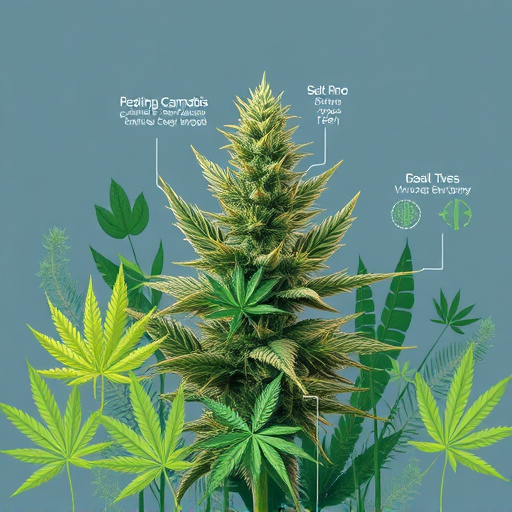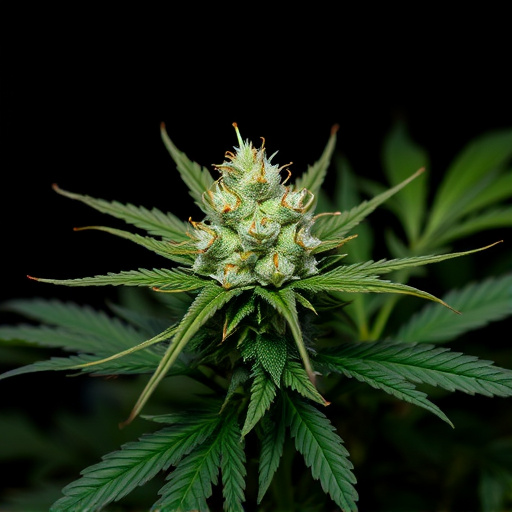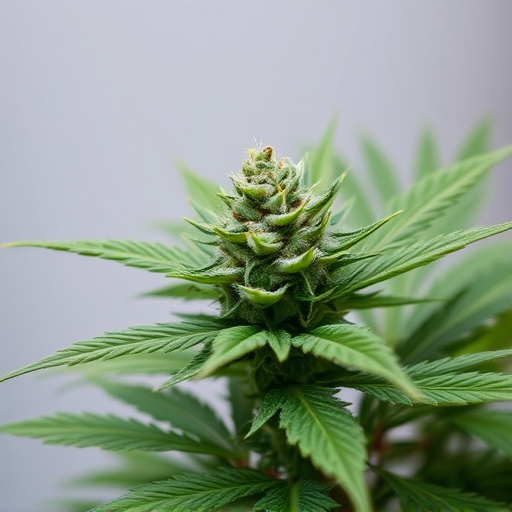High-THC sativa strains interact with the body's endocannabinoid system (ECS) to offer potent short-term therapeutic benefits like enhanced relaxation, creativity, and euphoria. However, excessive consumption can lead to adverse effects such as increased heart rate, dry mouth, respiratory issues, anxiety, paranoia, and cognitive impairment. Responsible use requires understanding individual tolerance, moderation, strain selection, and guidance from healthcare professionals to mitigate potential risks associated with high-THC sativas.
“Unraveling the complex relationship between high-THC sativa strains and the human body and mind is a fascinating journey. These potent varieties have gained significant attention for their diverse effects, from profound physiological impacts to nuanced mental health outcomes. This article delves into the science behind THC’s interaction with our endocannabinoid system, exploring both short-term and long-term physical health considerations. We also dissect the mental health landscape, discussing creativity vs. paranoia, and individual susceptibility. Furthermore, we guide consumers through navigating the high-THC sativa spectrum, offering insights on strain characteristics, hybrid combinations, and personalized choice.”
- The Physiological Effects of High-THC Strains
- – Understanding THC and its interaction with the endocannabinoid system
- – Short-term vs long-term effects on physical health
The Physiological Effects of High-THC Strains

High-THC strains, particularly those with a significant concentration of tetrahydrocannabinol (THC), have profound physiological effects on the human body. When consumed, THC binds to cannabinoid receptors in various organs, including the brain and immune system. This interaction can lead to a range of physical sensations and changes, such as heightened sensory perception, increased heart rate, dry mouth, and red, bloodshot eyes—effects often associated with what’s commonly known as being “high.”
Beyond these immediate effects, high-THC sativa strains are known for their ability to induce euphoria and alter mood. They can also temporarily enhance creativity and relaxation while potentially alleviating symptoms of anxiety and depression in some users. However, it’s important to note that excessive THC consumption may have adverse effects on the respiratory system and could exacerbate conditions like bronchial asthma. As with any substance, understanding individual tolerance and seeking guidance from healthcare professionals is crucial for safe and responsible use.
– Understanding THC and its interaction with the endocannabinoid system

THC, or tetrahydrocannabinol, is a primary psychoactive compound found in cannabis plants, especially in high THC sativa strains. It interacts with the body’s endocannabinoid system (ECS), a complex network of receptors and enzymes that regulate various physiological processes including mood, memory, appetite, and pain sensation. The ECS plays a crucial role in maintaining homeostasis, or balance, within the body. When THC binds to cannabinoid receptors, it can alter the normal functioning of the ECS, leading to the diverse effects associated with cannabis consumption.
High THC sativa strains are known for their potent psychological effects, including heightened sensory perception, increased creativity, and a sense of euphoria. However, these strains may also induce anxiety, paranoia, or disorientation in some individuals, especially those new to cannabis use or those consuming high doses. Understanding the interaction between THC and the endocannabinoid system is essential for navigating the potential benefits and risks associated with high THC sativa strains.
– Short-term vs long-term effects on physical health

High THC sativa strains, known for their potent effects, can have both immediate and lasting impacts on physical health. Short-term consumption may lead to heightened sensory experiences, increased relaxation, and reduced anxiety—a reason many turn to these strains for therapeutic purposes. However, prolonged use can result in adverse effects such as elevated heart rate, dry mouth, and potential respiratory issues, especially with high-concentration products.
Long-term exposure to high THC levels may contribute to more significant physical health concerns. Research suggests chronic users might experience impaired cognitive function, memory loss, and even an increased risk of cardiovascular problems. Understanding these disparities is crucial for responsible cannabis consumption, as it highlights the importance of moderation and strain selection, especially with powerful high-THC sativa varieties.
High-THC sativa strains significantly impact both the body and mind, with their potent effects stemming from interaction with the endocannabinoid system. While short-term use may offer therapeutic benefits for certain conditions, long-term exposure to high THC levels can lead to physical health issues. Understanding these dynamics is crucial for responsible cannabis consumption, enabling users to make informed decisions regarding their well-being.














